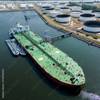A former Australian transport minister challenged oil tanker owners, who were meeting in Sydney on Tuesday, to join him in the fight against "slave-ships", which still thrive in the world's shipping trades.
At the end of a vigorous debate on corrosion in tankers, Peter Morris challenged the industry to take more interest in its human resources. "You've all been worrying about the rates of corrosion of metal, but what about the corrosion of lives?" he asked. "I think you and I are going to be working very closely in the future," he told Intertanko chairman Westye Hoegh.
Morris, transport minister from 1983 to 1987 in Bob Hawke's Labor government, said although members of the tanker owners' body Intertanko were not directly implicated in abuse of ships' crews, they should use their influence to help clean up the whole industry.
"There is a time slot of about 18 months in which to eliminate most sub-standard shipping, to put an end to the brutality and malpractice associated with these ships," he said.
Intertanko's Hoegh said they were already fighting the small margin of sub-standard operators, not least because they undermined the rest of the industry by undercutting prices. "They undermine what we're doing, and if we found any member with that kind of operation we would exclude them from membership," he said.
It was a view Morris supported. "These crews are being abused and mistreated in the name of lower freight rates he said.
Hoegh praised Australia's efforts in the 1990s, at the forefront of a global campaign against sub-standard bulk carriers, which was sparked by 400 deaths at sea in just two years. Morris suggested that if there was a marketing advantage in selling tuna that had been caught without killing dolphins, there must also be the potential to promote transport services in which "no seafarer had been starved, mistreated, injured or killed."
Morris published a report on the shipping industry last month entitled "Ships, Slaves and Competition", which stated that sub-standard operators saved around 15 percent of annual operating costs by avoiding international safety standards. It said, however, that wiping out these practices would lead to lower shipping costs through reduced insurance premiums.
The report found that on 10 to 15 percent of vessels, sailors from developing countries such as the Philippines and Indonesia were being subjected to poor safety conditions, excessive hours, unpaid wages, starvation diets, rapes and beatings.
"For many thousands of today's international seafarers, life at sea is modern slavery and their workplace a slave ship," read the report for the independent industry group International Commission on Shipping.
The report will now go to the 21 member economies of APEC -- the Asia-Pacific Economic Cooperation forum -- with the aim of issuing a communique on safer shipping. APEC transport ministers are scheduled to meet in Peru in October.
Morris told Reuters no one knew quite how many seafarers died at sea. "If you're going to die at sea, you better take the ship down with you, because that's the only way your family's going to hear about it," he said.
He added that the widows of seafarers lost at sea were routinely bartered down on death benefits by agents of the insurance clubs to which ship owners subscribe. Morris said the worst conditions were found in the fishing industry.
Once at sea, fishing vessels rarely enter port and are refueled and unloaded at sea, leaving crew no chance to seek help and fear of blackmail if they complain. "The voyage-by-voyage nature of employment in the shipping industry breeds uncertainty and job insecurity...it creates an underlying scenario of fear," said the report. Morris said a chaplain in Madagascar had told him of a fishing boat that had left port with 40 crew and had returned with 25. "The master said there had been a mutiny...The 15 missing seafarers had been executed with a revolver." - (Reuters)
Sponsored Content
Innovative Hull Maintenance: Profitable & Green

Subscribe for
Maritime Reporter E-News
Maritime Reporter E-News is the maritime industry's largest circulation and most authoritative ENews Service, delivered to your Email five times per week













